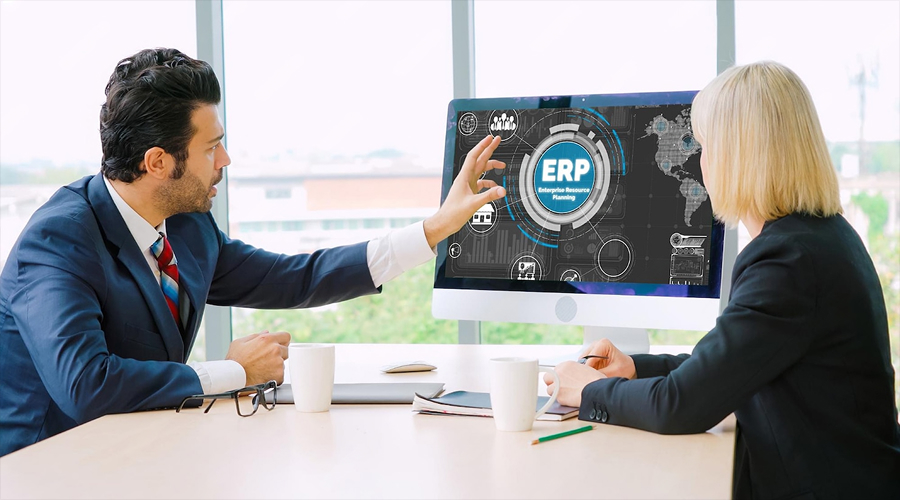
What is ERP Consulting?
Ever felt like your business operations are held together with duct tape and crossed fingers? Often, as companies scale, managing everything from inventory and accounting to customer service through scattered systems leaves teams stuck in constant firefighting mode. This is exactly the disorder ERP systems are built to tame. But deploying a software solution this complex takes more than just hitting “install.” ERP consulting is needed to steer the process.
What exactly is ERP consulting?

ERP consulting is all about helping companies evaluate, choose, and implement the right ERP system tailored to their unique needs.
Instead of wrestling alone with whether to build a custom solution or buy off-the-shelf, you can turn to experts who assess your business processes, current technology, and growth goals. They weigh factors like total cost of ownership, scalability, integration, compliance, and user experience to recommend the best-fit ERP, whether a customizable platform or a straightforward off-the-shelf system.
What’s also great is their knack for spotting and trimming the fat. Rather than reinventing the wheel with heavy custom builds, they identify only the essential tweaks you need, so you don’t end up draining your budget on bells and whistles you’ll never use.
Why not just do it yourself?
The DIY approach may sound tempting, but ERP is far from a plug-and-play setup. Studies show that up to 75% of ERP projects fall short of expectations, mostly due to poor planning, underestimating complexity, and misaligned execution.
An expert ERP partner keeps you from falling into common traps:
- misjudged timelines,
- hidden costs,
- mismatched features,
- and underprepared teams.
Without expert guidance, it’s easy to end up with a system that doesn’t align with how your company really operates. Frustrated staff and wasted investments soon follow.
When is the right time to bring in ERP consultants?
You don’t need to wait for disaster to strike. But certain red flags should set off alarm bells:
- Your teams are drowning in spreadsheets and manual processes.
- Data is scattered across platforms and hard to trust.
- Your current system can’t scale or support your business model anymore.
- Productivity is dropping due to disjointed workflows or frequent system downtime.
Whether you’re switching from legacy software or implementing ERP for the first time, consultants help you ensure your ERP journey leads to tangible results.
How an effective ERP implementation process should work
Getting an ERP system off the ground takes more than choosing software and crossing your fingers. Here’s how proper ERP implementation typically unfolds:
1. Partner selection
You’ll want a consultant who gets your industry and sees ERP as part of a broader business transformation. Check for case studies, real reviews, and whether they take time to understand your goals before proposing solutions.
2. Budget planning
Knowledgeable consultants help map out all cost components, from licenses to staff training, with a healthy buffer for the unexpected. It’s better to overestimate and come under than get caught short.
3. Business process mapping
Skipping this step risks going in circles. Understanding your internal processes helps prioritize what to automate and how best to align the system with real-world workflows.
4. Project planning
An implementation roadmap is built, covering system rollout models (big bang, phased, or hybrid), team roles, change management strategies, and timelines. Even smaller companies benefit from a well-organized structure here to maintain progress and clarity.
5. ERP system selection
Consulting partners narrow down choices based on your specific needs, from cloud-based giants like Oracle or SAP to flexible options like Odoo or NetSuite.
6. Configuration & customization
Where possible, experts aim to tweak settings instead of writing code from scratch. Such a cost-saving move keeps things simple.
7. Data migration
Data migration often ends up eating the most time and resources in an ERP project. Consultants help organize legacy data, decide what should be transferred, and create a migration plan that maintains accuracy without overloading the system.
8. Testing
Instead of focusing solely on features, proper testing is done with real users simulating real tasks to uncover issues before they go live.
9. User training
Training is tailored to fit each role, whether it’s hands-on sessions, online modules, or learning from teammates. Many consultants go with a train-the-trainer approach which spreads knowledge quickly and keeps training costs in check.
Summing up
ERP consulting is all about making sure the system works for you, not the other way around. With a trusted advisor in your corner, you set yourself up with a software solution that drives smoother operations, better data visibility, and long-term scalability.






